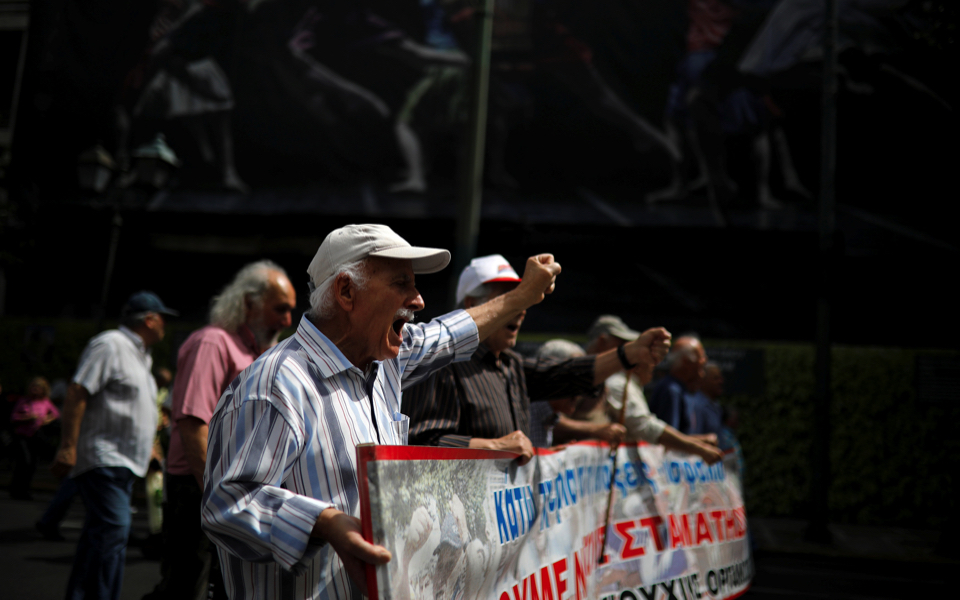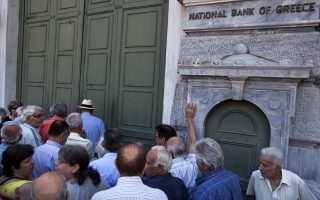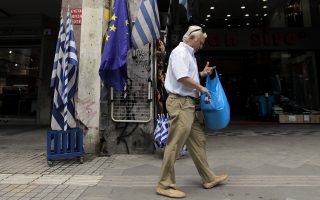Greek pension rationing begins as poll shows Tsipras backed

It’s a day of fresh indignities for the people of Greece.
About a third of the nation’s depleted banks cracked open their doors after being closed for three days. But all they did was ration pension payments, hours after the country became the first advanced economy to miss a payment to the International Monetary Fund and its bailout program expired.
While Greek retirees receive a fraction of what they’re due, European officials resume efforts to prevent the economy from cratering after more than five years of crisis-fighting. Finance ministers weigh a new aid bid from Prime Minister Alexis Tsipras and European Central Bank policy makers discuss whether to maintain their emergency lifeline.
“People are just completely fed up,” said Andrea Montanino, a former IMF executive board member who now heads the global economics program at the Atlantic Council in Washington.
The first poll before a snap referendum Sunday indicated most people back Tsipras. The survey, in Efimerida ton Syntakton newspaper, showed 54 percent would vote “no” — rejecting austerity in exchange for aid — and 33 percent would vote “yes” — accepting austerity as the price of staying in the euro. The poll was conducted by ProRata, which surveyed 1,200 people June 28-29 with a margin of error of 2.8 percent.
Turned away
On the third day of capital controls, a few dozen pensioners lined up by 7 a.m. at a central Athens branch of the National Bank of Greece, an hour before opening time. They were to receive a maximum of 120 euros ($133), compared with the average monthly payment of about 600 euros. Many left with nothing after the manager said only those with last names starting with the letters A through K would get paid.
“Not only will I have to queue for hours at the bank in the hope of getting 120 euros, but I’ll have a two-hour round trip,” said Dimitris Danaos, 77, a retired local government worker who was making the bus journey from his home outside the Greek capital to the suburb of Glyfada. “And I fear that this situation won’t be over anytime soon.”
Even the reduced payments risked putting more pressure on banks than they could bear, underscoring the desperate choices facing the six-month-old left-wing government and voters in the referendum. Two senior bank executives said as many as 500 of the country’s more than 7,000 automatic teller machines had run out of cash by Saturday morning. Skai television reported as much as 1 billion euros was withdrawn over the weekend.
A last-minute request for a new two-year rescue package to tide over the ravaged economy was sternly dismissed Tuesday by German Chancellor Angela Merkel, hours before Greece’s bailout officially expired at 1 a.m. in Athens.
Talks thaw
Nevertheless, there are tentative signs of a thaw as euro- area finance ministers take up Tsipras’s bid for the second time at 5:30 p.m. Brussels time. At first glance, a plan devoid of any economic-reform measures appeared to be a non-starter, according to three officials with knowledge of the first call on the proposal that took place Tuesday.
“The request from Greece appears designed to keep the region somewhat off-balance, and to create the impression that Tsipras is searching for an imaginative solution,” said Malcolm Barr, an economist at JPMorgan Chase Bank in London.
‘Little choice’
In an effort to give talks traction, Greece has agreed to offer more information and said it might change its referendum terms and recommendation, according to an official speaking on condition of anonymity.
“With no fundamental change in the institutions’ offer, Tsipras will have little choice than to maintain his support for a ‘No’ vote, as he announced last Friday,” analysts at Barclays Plc wrote in a note to investors. “This has become even more important, since he publicly declared that he would resign in case of a ‘Yes’ vote. The referendum is thus now about euro membership and Tsipras’s future.”
The ProRata poll showed the share of “no” votes dropping to 46 percent on Monday, after the imposition of capital controls, from 57 percent the day before. Support for a “yes” rose to 37 percent from 30 percent.
For now, at least, markets suggest investors are confident policy makers are containing the damage. The euro is trading at $1.11, about the same as before negotiations collapsed on June 26. The Euro Stoxx 50 Index rose 0.9 percent at 9:40 a.m. in London.
[Bloomberg]





